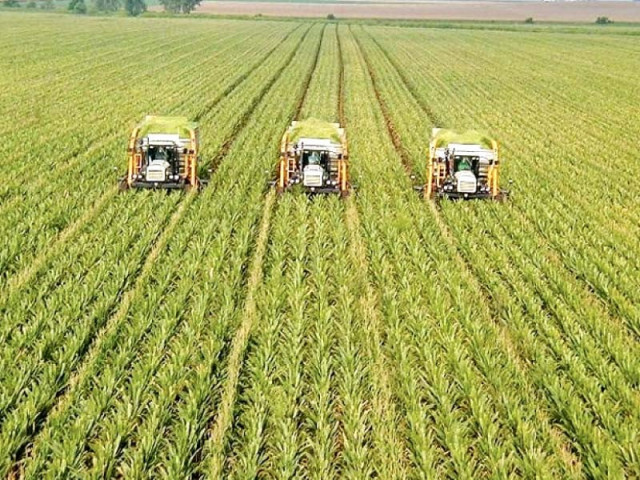Sindh launches Hydro-Agro programme
World Bank-funded initiative revolutionises water, agricultural management

The Sindh government has launched the Hydro-Agro Informatics (HAI) programme aimed at revolutionising water management and agricultural practices while focusing on the factors of climate change in the province.
Sharing details with The Express Tribune, experts and officials said the HAI programme falls under the Sindh Water and Agriculture Transformation (SWAT) project funded by the World Bank (WB).
This pioneering initiative, developed in collaboration with key stakeholders including the Sindh Irrigation Department, Sindh Irrigation and Drainage Authority (SIDA), and Agriculture Delivery Unit [crop reporting] of Sindh Agriculture Department, is committed to revolutionising water management and agricultural practices in the province. The HAI will have complete data of irrigation channels, agriculture, and weather.
Partnering with leading academic institutions and international expert organizations such as the US-Pakistan Centre for Advanced Studies in Water (USPCAS-W) at Mehran University of Engineering and Technology (MUET) in Jamshoro and the Centre for Environment and Geographic Information Services (CEGIS) Bangladesh, among others, the Sindh HAI programme aims to integrate hydrology, agriculture, climate, and information technology. Aligned with the National Water Policy 2018 and the strategic directions of the Sindh Water Policy 2023, this initiative heralds a new era of sustainable resource management and climate resilience.
The HAI programme represents a paradigm shift, leveraging advanced technologies including geographic information systems (GIS), sensors, analytics, and modelling to empower stakeholders and farmers with real-time data. This enables informed decision-making to optimise water usage, enhance crop productivity, and mitigate climate change impacts.
“The HAI will be prepared in around two years, as it is divided into two phases, including seven months for designing it and another one-and-a-half years for implementing it. Once the formal agreement is finalised and inked within a month between Project Coordination and Monitoring Unit (PCMU) of Sindh Planning and Development (P&D) Department and USPCAS-W of MUET, the work on the programme will be initiated,” said Prof Dr Kamran Ansari, Lead of the HAI programme team and Director of USPCAS-W of MUET.
Speaking about irrigation data, SIDA GIS Specialist Mohammad Ibrahim Memon said he has already started working on water channels, drainage systems, embankments, tube-wells, groundwater, small dams, and water flows.
Spokesperson for SIDA Hizbullah Mangrio said that launching the HAI programme will digitise all data of agriculture, irrigation, and weather, as the Sindh government took an initiative with the help of the WB to get rid of the conventional and old-fashioned system. He said establishing the HAI centre will update concerned departments, farmers, and locals about the current flow of water, water data, standing crops, seasons, weather, productivity-cum-produce of crops, and other ground realities.
Meanwhile, with growing global water scarcity, efficient water management is paramount as the programme will equip water managers and farmers with the tools needed to monitor, measure, and conserve water resources effectively, ensuring sustainability in the face of climate change, said Nazir Ahmed Memon, Project Coordinator of SWAT, Sindh P&D department, at a programme held the other day, according to a press statement.
“We invite stakeholders from across sectors to join us in this journey towards sustainable agriculture. Together, let us embrace Hydro-Agro Informatics as a transformative tool for a more prosperous and resilient future for Sindh,” he said.
Dr Greg Browder, Lead Water Resources Management Specialist from the World Bank and Task Team Leader for SWAT, highlighted the programme’s pivotal role in modernising water and agricultural management practices, fostering sustainability and resilience in Sindh. Structured into two phases, with the first focusing on design and the second on development and commissioning, Phase-I sets the foundation for transformative change. Across the globe, Hydro-Agro Informatics is yielding promising results, from sensor-based irrigation management systems in California to satellite-based monitoring in Africa.
Published in The Express Tribune, May 4th, 2024.
Like Business on Facebook, follow @TribuneBiz on Twitter to stay informed and join in the conversation.


















COMMENTS
Comments are moderated and generally will be posted if they are on-topic and not abusive.
For more information, please see our Comments FAQ